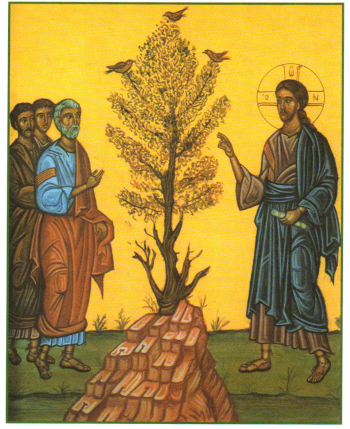
On any TV channel we see all kinds of promises of quick ways to improve our memory, learn a new language, or cure arthritis and be well enough to win the PGA Championship like Phil Mickelson did — probably thanks to the arthritis pills he promotes in TV ads! We live in a world oriented toward instant gratification. We want things to come fast as well as easy. For example, I personally wish I could instead take a weight loss pill than work on my diet and exercise. I want to see those pounds just drop off, as if by magic. We also try to apply this same perspective to spiritual growth. Our Lord reminds us in the Parable of the Seeds that we need to give ourselves time to grow in God. While the mustard seed can grow into a great shrub, it can’t do it on its own; it needs help.
For the Kingdom of God to expand here on earth in the hearts of men, it must be planted in good soil, which our Lord covered at the beginning of Mark chapter 4. There, in a familiar parable, we are told about the hard soil of a path, the rocky ground and the area choked with thorns. It’s all about the garden of the heart.
In today’s Gospel, Jesus shares the parable of the mustard seed to explain faith in the kingdom of God. The mustard seed is tiny, but it grows into an amazingly large tree when fed properly. Faith is the mustard seed, and the tree is the kingdom of God, but that transition doesn’t happen automatically, and not overnight. To add on a very imperfect tangent to Jesus’ analogy: prayer is the cultivation of that faith. Prayer is how we foster that mustard seed and allow it to bloom and thrive. As we focus on praise to and sacrifice for God, our faith grows and gains strength. Our prayers of intercession are often not answered the way we wish, but, as with Jesus in Gethsemane, we form ourselves to the will of God through prayer anyway, recognizing that His Will is above our own and trusting that His Will holds ultimate joy; joy that transcends momentary sorrow and pain.
The Lord does not wait until we are ready to act or to reach out to people. God simply goes on loving his people and moving people to act where it is needed — whether we are ready or not. In the Gospel today, are examples of what the kingdom of God is like. Jesus compares it to plants growing in the ground. The farmer plants the seed, but the plants grow by themselves, “…without his knowing how.” God continues to work and guide people to Himself whether we take part or not.
Sometimes I think that our work is a bit like that of the farmer in the parable. We are called to plant seeds. We try to be signposts to God, pointing them in the right direction and then God does everything else. By ourselves, we are very limited in what we can do, but the thing is that we do have a part to play. God invites us to be part of his work, helping others along the road to heaven — perhaps by prayer, perhaps by example. All of us are invited to play a part. For most of us it is a hidden part. I think we often underestimate the importance of praying for others. We speak to them about God mostly by the way we live.
“Great holiness consists in carrying out the little duties of each moment.”
-St. Josemaria Escriva
The mustard seed is a tiny seed, but it can grow into something many thousands of times its size. In other words, although we are small, we can have a lasting influence on the world around us… even though we may not realise it in our own lifetime. The Church is meant to be small. We are not meant to be big and powerful, and we have seen what happens when we get too big and powerful; we forget what we are about and we caught up in prestige and status and our own importance. But when we are small, we remain dependent on God and focused on God. That is when God can work through us most effectively because we don’t get in the way. When we are not full of ourselves there is room for God.
The Apostles wanted Jesus to be big and powerful. James and John asked if they should call down fire on a town that didn’t make them welcome. Another time, one of them asked Jesus if the time had come for God to “restore the kingdom to Israel,” — in other words to kick the occupying Romans out and become powerful once again. But the way of Jesus was something very different and unexpected. His was the way of the cross. He was despised and rejected and appeared to be a complete failure. The Apostles found this very hard to accept but eventually God helped them to learn that this was the path that they too must walk.
God goes on making his kingdom grow; drawing people to himself and helping people to find their way; most of the time we don’t know how. We are invited to play our part by praying for those around us and speaking about God through the way we live.
Participation is key to natural growth. As I heard someone say many years ago, “You can’t become a mature Christian merely by going to church any more than you can become a car by sleeping in the garage.” We can’t just go through the motions. There is really no such thing as “going to church.” It is more a matter of “being the Church;” earnestly involving ourselves in the things of God. This is our daily mission.
St. Josemaria Escriva. In his little book “The Furrow” writes, “Grace, like nature, normally acts gradually. We cannot, properly speaking, move ahead of grace. But in all that does depend on us we have to prepare the way and cooperate when God grants grace to us”.
“You go to pray; to become a bonfire, a living flame, giving light and heat.”
-St. Josemaria Escriva
-Dcn. Terry Murphy

